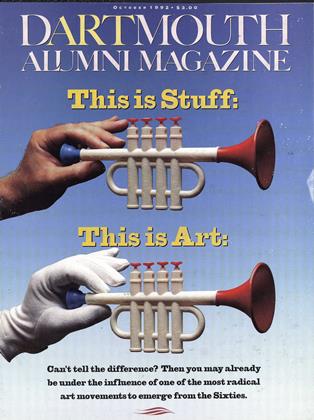Divers Notes & Observations
THERE'S A BIG SIGN ON OUR way upstreet (as the natives say)—"' 96, Welcome Aboard the U.S.S. Topliff'—which we don't , think the venerable dorm has been called since it housed Navy V-12s during WW II. We thought the '96s looked younger than usual, until we remembered that we probably had become too used to driving carefully amid all the kids of the tennis, basketball, and soccer camps who swarmed over the campus all summer. An associate reminded us, however, that the time to worry was when it was the parents who started to look younger
APT CHOICE AS SPEAKER AT Dartmouth's 223rd Convocation was chemist Dudley Hershbach of Harvard, just days before the dedication of the College's new $26.5 million headquarters for the Chemistry Department, Burke Laboratory. Dr. Hershbach's 1986 Nobel award was for his research on the dynamics of chemical reactions, and his inspiring talk, entitled "The Impossible Takes a Little Longer," concerned the dynamics of the impossible. President Freedman awarded him an honorary doctor of science degree. The president's own talk challenged the class of '96 to elevate its sights and seek out and emulate leaders who are idealists. His hero-of-the-year (and we use the term admiringly) was the ex-president of Czechoslovakia, Vaclav Havel.
The very current president of the Student Assembly, Andrew Beebe '93, added his own brand of idealism to Convocation. On fraternities and sororities, he said, "During a period in our lives when understanding different views and perspectives could not be more important to the holistic education, the last policy we want to continue is one that is isolating instead of unifying men and women on this campus. We should be gaining from each person, not every other person . . . but part of the Greek system segregates you solely on the basis of your gender. It is your prerogative to challenge the tradition, and if you disagree with it, change it."
A listless Dartmouth first half at the Penn game, but the team came to championship life in the second. Jay Fiedler '94 threw five TD passes (the most since Swede Oberlander '26 threw six in 1925, the year the College won the national championship), and the score ended up Dartmouth 36, Penn 17. First Green victory over Penn on Memorial Field since 1980, and things suddenly looked brighter. Even brighter the Sunday following, when both soccer teams beat the Quakers, the women 6-0, and the men in a double-overtime barn-burner, 3-2. The men's basketball squad has just returned from a training trip to Spain, where they were 4 and 3 against an assortment of professional teams of varying abilities. And back to football, we want to assure Coach Buddy Teevens '79 that at least one thing hasn't changed since he left the Big Green. We rarely ever got the full Dartmouth game accounts in the Sunday New York Times, and now we can't get Tulane's either.
New faces: John C. Duffy, M.D., distinguished teacher and and former Assistant U.S. Surgeon General under C. Everett Koop '37, will be assistant dean for admissions of the Med School and also associate director of Dr. Koop's new institute, briefly described in our last issue. On the 20th anniversary of Dartmouth's Native American program (strictly counting, isn't it actually the 223rd?), Russell Thornton, sociologist and leading Native American scholar, will become the first holder of the newly established Samson Occom Professorship. Not exactly new is former Vermont Governor Madeleine Kunin, as Distinguished Visiting Fellow at Rockefeller Center, where she will be working on the Rock's tenth anniversary program, to take place next spring. Also familiar: Michael Dorris and Louise Erdrich '76, Montgomery Fellows during October.
Finally, all systems were go and right on time for the new term—except for Baker's four-sided clock.
Students come aboardas the football teamsuccessfully launchesthe Ivy season.
 View Full Issue
View Full Issue
More From This Issue
-
 Feature
FeatureTHE LISTENING DEAN
October 1992 -
 Cover Story
Cover StoryThe Stuff of Art
October 1992 By LEE MICHAELIDES -
 Feature
FeatureThe Underground Curriculum
October 1992 By Tim Brookes -
 Article
ArticleThe Lost Season
October 1992 By JIM COLLINS '84 -
 Article
ArticleDid Something Happen in 1492?
October 1992 By William Spengemann -
 Class Notes
Class Notes1985
October 1992 By Rick Joyce
"E. Wheelock"
-
 Article
ArticleDr. Wheelock's Journal
February 1992 By "E. Wheelock" -
 Article
ArticleDr. Wheelock's Journal
March 1993 By "E. Wheelock" -
 Article
ArticleDr. Wheelock's Journal
MARCH 1994 By "E. Wheelock" -
 Article
ArticleDr. Wheelock's Journal
MARCH 1995 By "E. Wheelock" -
 Article
ArticleDr. Wheelock's Journal
June 1995 By "E. Wheelock" -
 Article
ArticleDr. Wheelock's Journal
January 1996 By "E. Wheelock"
Article
-
 Article
ArticleMemorial Resolutions
June 1924 -
 Article
ArticleDartmouth College Athletic Council
February 1935 -
 Article
ArticleSecretaries Meetings
June 1937 -
 Article
ArticleDartmouth Students Again
August 1942 -
 Article
ArticleHis Research Stirs Medical World
DECEMBER 1966 -
 Article
ArticleWinter Sports Activities
January 1949 By John R. Zillmer '48

